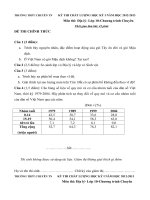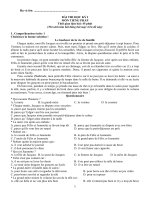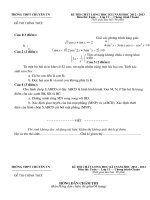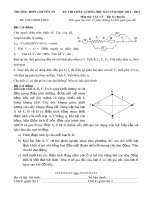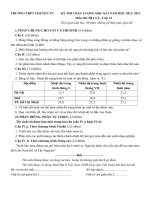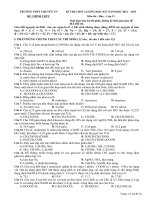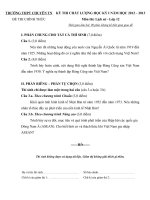de thi cum THPT (giua ky I)
Bạn đang xem bản rút gọn của tài liệu. Xem và tải ngay bản đầy đủ của tài liệu tại đây (77.79 KB, 4 trang )
Sở gd-đt bắc giang Đề kiểm định giữa học kỳ 1 năm học 2010-2011
Cụm thpt tp. bắc giang Môn thi: Tiếng Anh Lớp: 12 (Hệ 7N)
Thời gian làm bài: 45 phút không kể thời gian giao đề.
Mã đề: 157
I. Phần chung cho tất cả các thí sinh (8 điểm)
Câu 1 :
Mary...............in London for 5 years.
A.
was living
B.
lives
C.
is living
D.
has lived
Câu 2: Xác định từ/cụm từ có phần gạch chân cần phải sửa để trở thành câu chính xác
To attract the waiters attention, you can wait until he passes near us, catch his eyes and
A B C
nodded slightly.
D
Câu 3 :
I still cant believe it ! My bicycle..............last night.
A.
was stolen
B.
stolen
C.
stole
D.
was stealing
Câu 4 :
What....................if you saw a pickpocket steal money from someone in the street ?
A.
do you do
B.
would you do
C.
will you do
D.
did you do
Câu 5 :
He said that he...............her before.
A.
meeting
B.
has met
C.
had met
D.
met
Câu 6: Xác định từ/cụm từ có phần gạch chân cần phải sửa để trở thành câu chính xác
I can go with you if I will get my work finished.
A B C D
Câu 7 :
In England,schools in which all students can attend without paying tution fees
are......................
A.
universities
B.
state schools
C.
independent schools
D.
communication colleges
Câu 8 :
Ill wait here until you.....................
A.
will return
B.
will have returned
C.
return
D.
are returning
Câu 9 :
Unless he immediately, he wont get any information.
A.
will phone
B.
wont phone
C.
doesnt phone
D.
phones
Câu 10 :
Many young people have objected to................marriage, which is decided by the parents
of the bride and the groom.
A.
agreed
B.
contractual
C.
shared
D.
sacrificed
Câu 11 :
Chọn từ có phần gạch chân có cách phát âm khác với các từ còn lại
A.
shows
B.
thanks
C.
suggests
D.
translates
Câu 12 :
Chọn từ có phần gạch chân có cách phát âm khác với các từ còn lại
A.
offered
B.
warned
C.
replied
D.
advised
Câu 13: Xác định từ/cụm từ có phần gạch chân cần phải sửa để trở thành câu chính xác
I didnt see Ann since she went to live in the capital.
A B C D
Câu 14 :
She told me that she would go to Ha noi.................
A.
tomorrow
B.
the following day
C.
the day before
D. next day
Câu 15 :
Students usually....................their GCSE examination in early June.
A.
follow
B.
take
C.
pass
D.
make
Câu 16 :
Chọn từ có phần gạch chân có cách phát âm khác với các từ còn lại
A.
child
B.
chemist
C.
cheap
D.
chair
1
Câu 17: Xác định từ/cụm từ có phần gạch chân cần phải sửa để trở thành câu chính xác
She is looking forward to go to Europe after she finishes her studies at the university.
A B C D
Câu 18 :
My little brother is very naughty. Our grandparents always say hes as......................as a
monkey.
A.
mischievous
B.
supportive
C.
caring
D.
obedient
Câu 19 :
She revised her lessons well and could answer all the questions with......................
A.
confide
B.
confidence
C.
confidently
D.
confident
Câu 20 :
They live in a very...............family, so they are very happy.
A.
selfish
B.
crowed
C.
suitable
D.
close - knit
Câu 21 :
The .................year in Viet nam runs from September to June and is divided into 2 terms.
A.
academical
B.
academicals
C.
academic
D.
academically
Câu 22 :
Chọn từ có trọng âm khác với các từ còn lại
A.
academic
B.
education
C.
compulsory
D.
independent
Câu 23: Xác định từ/cụm từ có phần gạch chân cần phải sửa để trở thành câu chính xác
A new school is going to be build in this village.
A B C D
Câu 24 :
It is not polite..................questions about age, marriage and income.
A.
asked
B.
to being asked
C.
to ask
D.
asking
Câu 25 :
Chọn từ có trọng âm khác với các từ còn lại
A.
cinema
B.
primary
C.
statistics
D.
chemistry
Câu 26 :
When I came to see her yesterday, she..............a book.
A.
was reading
B.
reading
C.
were reading
D.
read
Câu 27: Xác định từ/cụm từ có phần gạch chân cần phải sửa để trở thành câu chính xác
To keep our relationship, I often send her greeting cards in special occasions.
A B C D
Câu 28:
A woman has to ..............more in marriage than a man.
A.
apologize
B.
determine
C.
equalize
D.
sacrifice
Câu 29 :
To get someones attraction, we can use either verbal or ............form of communication.
A.
non - verbal
B.
nor - verbal
C.
no - verbal
D.
none - verbal
Câu 30 :
Chọn từ có trọng âm khác với các từ còn lại
A.
honest
B.
prepare
C.
polite
D.
explain
Câu 31 :
His brother ................high school 6 years ago.
A.
has finished
B.
finishes
C.
finish
D.
finished
Câu 32 :
Schooling is ..................for all English children from the age of five to sixteen.
A.
essential
B.
compulsory
C.
necessary
D.
voluntary
II. Phần riêng Phần tự chọn (2 điểm)
A.Dành cho thí sinh theo ch ơng trình chuẩn
Đọc đoạn văn và chọn đáp án đúng.
"Where is the university?" is a question many visitors to Cambridge ask, but no one can
give them a clear answer, for there is no wall to be found around the university. The
university is the city. You can find the classroom buildings, libraries, museums and offices
of the university all over the city. And most of its members are the students and teachers or
professors of the thirty-one colleges.
Cambridge was an already developing town long before the first students and
teachers arrived 800 years ago. It grew up by the river Granta, as the Cam was once called.
A bridge was built over the river as early as 875.
In the fourteenth and fifteenth centuries more and more land was used for college
buildings. The town grew much faster in the nineteenth century after the opening of the
2
railway in 1845. Cambridge became a city in 1951 and now it has the population of over
100,000. Many young students want to study at Cambridge . Thousands of people from all
over the world come to visit the university town. It has become a famous place all around the
world.
Câu 33: Most visitors come to Cambridge ________________.
A. to see the university B. to study in the colleges in Cambridge
C. to find the classroom buildings D. to use the libraries of the universities
Câu 34: The university began to appear around in the ________________ century.
A. 8th B. 9th C. 13th D. 15th
Câu 35: People named Cambridge the "city of Cambridge " because _______________.
A. the river was very well-known B. there is a bridge over the Cam
C. it was a developing town D. there is a river named Granta
Câu 36: The town really began to develop after _____________.
A. 800 B. 875 C. 1951 D. 1845
Câu 37 :
Someone is using the computer at the moment.
A.
The computer is being used at the
moment.
B.
The computer is used at the
moment.
C.
The computer at the moment is
being used.
D.
The computer are being used at the
moment.
Câu 38:
Cindy said I haven t seen John since last month .
A.
Cindy said she hadnt seen John
since the previous month.
B.
Cindy said she doesnt see John
since previous month.
C.
Cindy said she hasnt seen John
since the previous month.
D.
Cindy said she wasnt seen John
since the previous month.
Câu 39 :
I can t understand him because he speaks so quickly.
A.
If he had spoken slowly, I could
have understood him.
B.
If he speaks slowly, I cannot
understand him.
C.
If he spoke slowly, I could
understand him.
D.
If he spoke so quickly, I could
understand him.
Câu 40:
She didn t have anyone repair the car.
A.
She had the car repaired by anyone.
B.
She hired someone to repair her car.
C.
She knew nothing about car repair.
D.
She repaired the car herself.
B.Dành cho thí sinh theo ch ơng trình nâng cao
Đọc đoạn văn và chọn đáp án đúng.
Education is not an end, but a means to an end. In other words, we do not educate
children only for the purpose of educating them. Our purpose is to fit them for life.
In some modern countries it has , for some time, been fashionable to think that by free
education for all whether rich or poor, clever or stupid one can solve all the problems
of society and build a perfect nation. But we can already see that free education for all is not
enough we find in a such countries a large number of people with university degree; they
refuse to do what they thing low work; and, in fact, work with hands is thought to be dirty
and shameful in such countries. But we have only to think a moment to understand that the
work of a completely uneducated farmer is far more important than that of a professor; we
can live without education, but we die if we have no food. If no one cleaned our streets and
took the rubbish away from our house, we should get terrible diseases in your towns.
In fact, when we say that all of us must be educated to fit us for life, it means that we
must be educated in such a way that, firstly, each of us can do whatever work suited to our
brains and ability and, secondly, that we can realize that all jobs are necessary to society,
and that is very bad to be ashamed of ones work. Only such a type of education can be
considered valuable to society.
3
C©u 33: The writer of the passage thinks that………………………
A. education can settle most of the world’s problems.
B. free education for all probably leads to a perfect world.
C. free education won’t help to solve social problems.
D. all the social problems can’t be solved by education.
C©u 34: The writer wants to prove that .……………
A. our society needs all kinds of jobs.
B. our society needs free education for all
C. a farmer is more important than a professor
D. people with high education refuse to do what they thing “low” work.
C©u 35:The purpose of education is ..…………………
A. to choose a system of education
B. to prepare children mainly for their future work
C. to let everyone receive education fit for him
D. to build a perfect world
C©u 36: The passage tells us about .of education.…………………
A. the means B. the system C. the value D. the type
C©u 37 :
The telephone rang right after he had left the office.
A.
Hardly had the telephone rung when
he left the office.
B.
Hardly had he left the office when
the telephone rang.
C.
He left the office. Since then, the
telephone rang.
D.
Whenever he left the office, the
telephone rang.
C©u 38 :
When they arrived, the good seats were already taken.
A.
They had to stand for a long time to
have good seats.
B.
They arrived late enough to get
good seats.
C.
They didn’t get good seats because
they arrived too late.
D.
They couldn’t get good seats
although they arrived early.
C©u 39 :
Charlie said I haven t seen Bill for a while .‘ ’ ’
A.
Charlie said that he hadn’t seen Bill
for a while.
B.
Charlie said that he hasn’t seen Bill
for a while.
C.
Charlie said that I haven’t seen seen
Bill for a while.
D.
Charlie said that he hadn’t see Bill
for a while.
C©u 40 :
I wanted to buy a dictionary, but I don t have enough money.’
A.
If I had enough money,I would buy
a dictionary.
B.
If I have enough money, I buy a
dictionary.
C.
If I have enough money, I will buy
a dictionary.
D.
If I had had enough money, I would
have bought a dictionary.
The end
4
